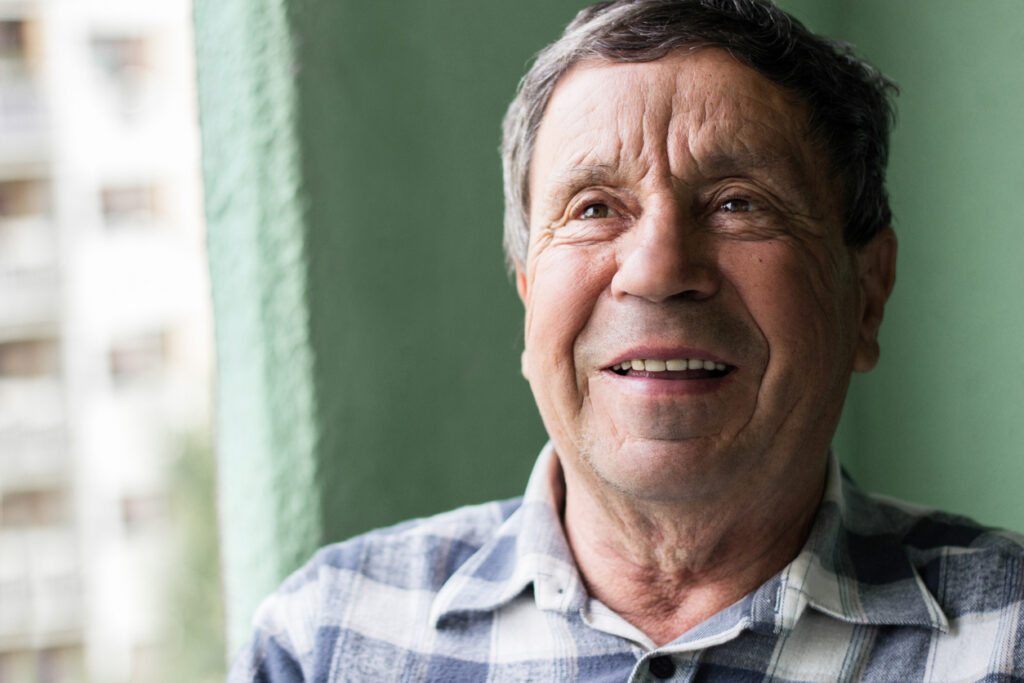Imagine that your body is fighting against you at every turn, calcifying your bones, resulting in crippling headaches, weakness, stiffness of your arms and legs and ongoing abdominal pain.
This has always been part of Chris’ life, as he was born with a genetic disorder called Pseudohypoparathyrodism, which blocks the parathyroid hormone from regulating his calcium levels.
The diagnosis
Chris was diagnosed as a baby. The doctors told his parents he wasn’t going to live long and would likely never walk. Overwhelmed by the diagnosis, they placed him in foster care. But even as a baby, Chris was a fighter. Now in his 40s, he can walk with minimal issues and can even drive, though the pain continues to be present in his daily life.
Since this challenging beginning, Chris has experienced a lot of factors that have prevented him from living a happy, healthy life. As he tells his story, he admits that things had been rocky for a long while after he lost his teen-aged daughter. Many years in Vancouver were spent using and dealing drugs, and a move to Calgary was an attempt at a fresh start.
0.3-1%
of the population is diagnosed with pseudohypoparathyroidism
Chris’ daughter Samantha was his bright light
She shared the same genetic condition as Chris, but it affected her much more. Her lungs never fully developed, and calcification of her arms and legs meant she was in a wheelchair. Samantha was funny, caring, and never let what she couldn’t do get her down. She would post make-up videos on YouTube where she’d show other kids how to do beautiful eyeshadow and mascara. In those videos she’d discuss bullying and encouraged other kids to be kind and accepting of those with disabilities. Chris shows off her videos beaming with fatherly pride.

“I used to take her to the park, take her to get Happy Meals at McDonald’s, feed the ducks at the park. I’d do her hair and nails and buy her nice dresses. She loved Barbies – she had the corvette, the house – everything. I tried my best. I would never put her in danger. She was my number one priority.”
In 2013, Samantha passed away, and Chris’ substance use and gambling addictions worsened to fill the void she left behind.
“I started drinking even worse because I had no purpose now. I had nothing.”
A father’s grief
Chris tried to push through and keep working but struggled to stay employed: if it wasn’t the drinking that led to losing a job, it was the physical toll that minimum wage work had on his fragile health. He still feels the long-term effects of several on-the-job injuries, as his alcoholism had made it hard to access health care.
“I went to a doctor’s office in Calgary but I kept missing the appointments because I was drunk all the time and couldn’t remember. Eventually the doctor said ‘Chris I can’t have you as a patient anymore’ and kicked me out of the clinic.”

Chris was also struggling to meet his basic needs. There were holes in his shoes, he couldn’t pay rent, and because he wasn’t seeing a doctor and didn’t have coverage, he wasn’t able to get the medications he needed to manage his thyroid condition.
One day, Chris walked into the Bowness Community Centre for a food hamper. After telling a volunteer about himself, she recommended Chris go to The Alex for support. When he agreed she called and made an appointment for him.
Chris didn’t expect much from The Alex, considering he’d been rejected by so many other service providers.
“I came in for the interview and they accepted me right away. Dr. Sun was the first doctor that could tolerate me at the time.”
Chris’ journey to health, wellness, and community
After finally finding a place where he was accepted and not judged, Chris’ life started improving. He stopped drinking, and though he still struggles with gambling, he credits the pandemic with getting it down to a “dull roar.”
In addition to a doctor, Chris also sees a mental health counsellor at The Alex, who has helped him understand the psychological factors of his addictions, and to heal, build strength and resilience. He made a big step in the right direction recently when he banned himself from online gambling websites through the Alberta Gaming Liquor Commission (AGLC), which means if he tries to access them again, the site will automatically block him.
Today, Chris lives in a cozy basement suite in Taradale and has been there for two years. He also has a girlfriend who he credits as being one of the reasons he gets up in the morning.
“She also helps me with the gambling. When I say we should go to the casino she says no,” he laughs.
Chris owns a truck, a French bulldog named Gunner, and a home sound system with subs, all of which give him joy. He’ll take any opportunity to show you pictures of his life these days. He looks so happy as he talks about off-roading in his truck or the birthday party he threw for Gunner.
Now that he has consistent, compassionate care at The Alex, Chris has also been managing his thyroid condition much better. He says he only has bad days when he misses his medications.
Chris has also been seeing a social worker at The Alex, who has helped him with claims for his workplace injuries and with some of the fines he’s accrued. He says it’s been a huge help because the justice system is complicated. They go to court with him, advocate for him, and help navigate the process.

Chris says he kept coming to The Alex because they showed him that there was more to him than he could see through his addictions. When he comes to The Alex he can see his doctor, counsellor, and social worker all in one trip, allowing him to get the wraparound support he needs without having to tell his story over and over again.
“[The Alex] gives you to tools, but you gotta be resourceful, you gotta be a survivor. Drugs can take you down or you can take it down. If you asked how I got to where I’m at, I couldn’t tell you. What made me change? It was every little step up that got me where I am. Each small thing I did I made a better decision.”
